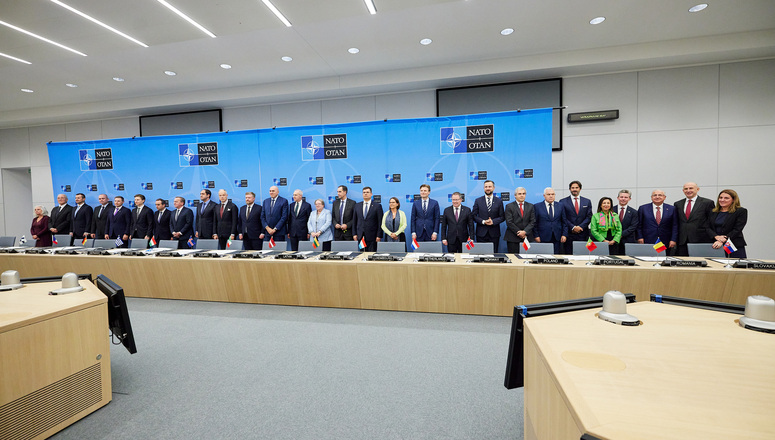On Thursday (17 October 2024), NATO launched five initiatives designed to address some of the most critical areas for Allied deterrence and defence. These new multinational High Visibility Projects will involve a total of 26 Allies and will help deliver critical capabilities that will enhance interoperability among NATO forces.

Contributing Allies took part in a signing ceremony during a meeting of NATO Defence Ministers at NATO Headquarters. NATO's Acting Deputy Secretary General Boris Ruge welcomed "the beginning of more meaningful work in new areas, but also important milestones for existing projects," adding that "it's a great example of how our Alliance delivers".
The first project aims to accelerate the delivery of new generation Remotely Piloted Aircraft Systems (RPAS) - such as NATO's Alliance Ground Surveillance (AGS) - through multinational cooperation. Thirteen Allies kicked off the project: Czechia, Estonia, Finland, Greece, Italy, Latvia, Lithuania, Norway, Portugal, Romania, Spain, Türkiye and the United Kingdom. RPAS fleets are essential to a range of roles and missions including joint intelligence, surveillance and reconnaissance and electromagnetic warfare.
The second initiative seeks to increase the interchangeability and interoperability of key Allied artillery munitions. With initial contributions from 15 Allies - Czechia, Denmark, Finland, France, Greece, Hungary, Italy, Latvia, Lithuania, Norway, Portugal, Slovakia, Türkiye, the United Kingdom and the United States - the project will contribute to harmonizing national fire testing and certification mechanisms. It will also help keep relevant standards up-to-date and support their adoption.
The Distributed Synthetic Training Environment project aims to respond to the ever-growing demand for virtual training at the multinational level. It establishes a network of advanced and immersive multinational training opportunities for militaries. Eighteen NATO nations have joined the project: Belgium, Czechia, Denmark, Estonia, France, Germany, Greece, Italy, Latvia, The Netherlands, Norway, Poland, Portugal, Spain, Sweden, Türkiye, United Kingdom and the United States. By leveraging national simulated training capabilities for multinational purposes, the project will bring immense operational benefits and economies of scale.
NATO is further stepping up its efforts to support Allied delivery of space technologies with two new projects. Through NORTHLINK, 13 Allies - Canada, Denmark, Finland, France, Germany, Hungary, Iceland, Italy, Luxembourg, the Netherlands, Norway, Sweden and the United States - will explore the development of a secure, resilient and reliable multinational Arctic satellite communications capability. Through the STARLIFT initiative, 14 nations - Belgium, Finland, France, Germany, Hungary, Italy, Luxembourg, the Netherlands, Norway, Spain, Sweden, Türkiye, United Kingdom, United States - will investigate ways to strengthen NATO's access to and use of space to deal with a range of challenges coming from operating from space. STARLIFT may help Allies to launch assets on short notice, manoeuvre a pre-positioned spare spacecraft or buy data from commercial partners during crisis or conflict
Further steps were also taken to advance work on two projects already underway: the Next Generation Rotorcraft Capability (NGRC) and NATO's cross-border airspace cooperation. Launched in 2020 and managed by the NATO Support and Procurement Agency (NSPA), the NGRC initiative aims to replace medium multi-role capabilities ending their life cycle in 2035 and beyond. On Thursday, five of the participating Allies - France, Germany, Italy, the Netherlands, and the United Kingdom - committed to identify a single preferred solution for the replacement of these capabilities by the end of 2027, thereby enabling the development of this solution in 2030.
NATO's cross-border airspace initiative also grew to 20 member countries with the addition of Denmark, Germany, Iceland and Portugal. First launched in October 2023, the project aims to foster civil-military cooperation on the use of airspace for NATO training and exercises, and other air activities in several regions of Europe.






